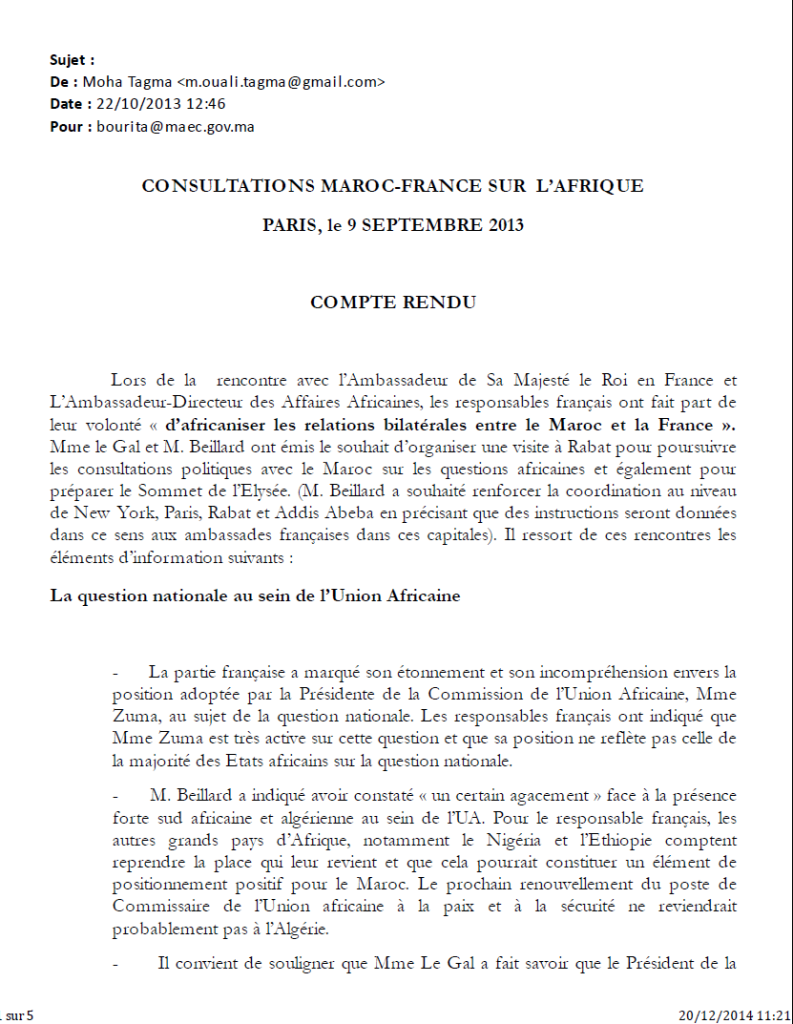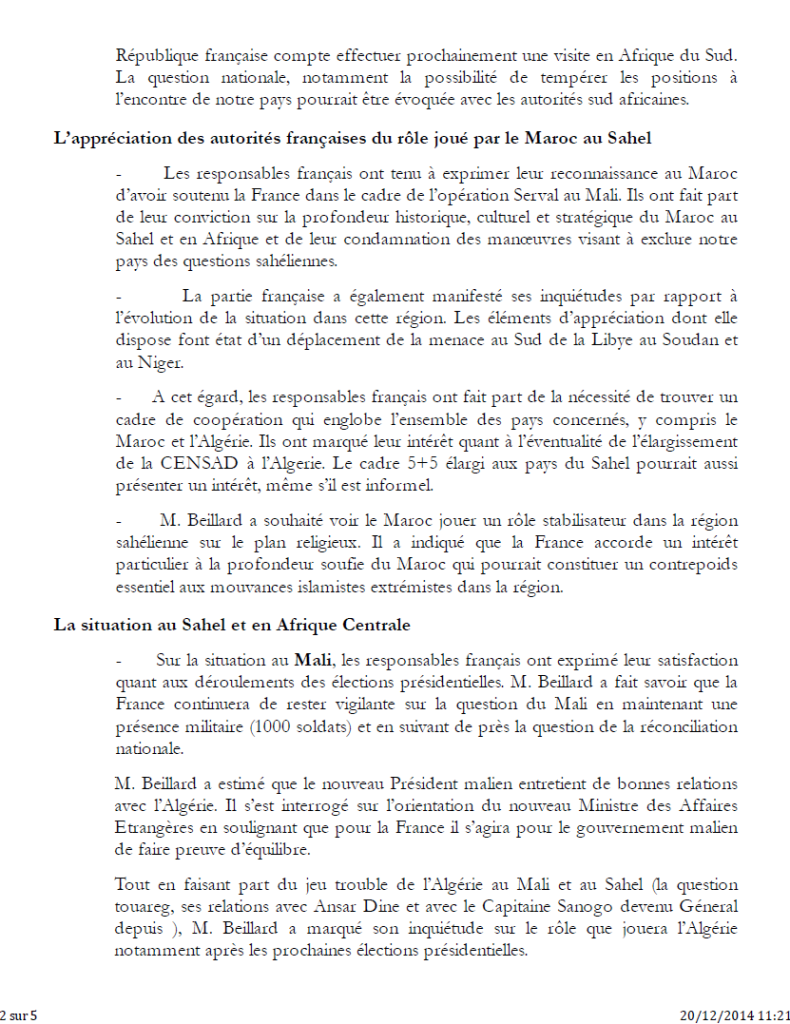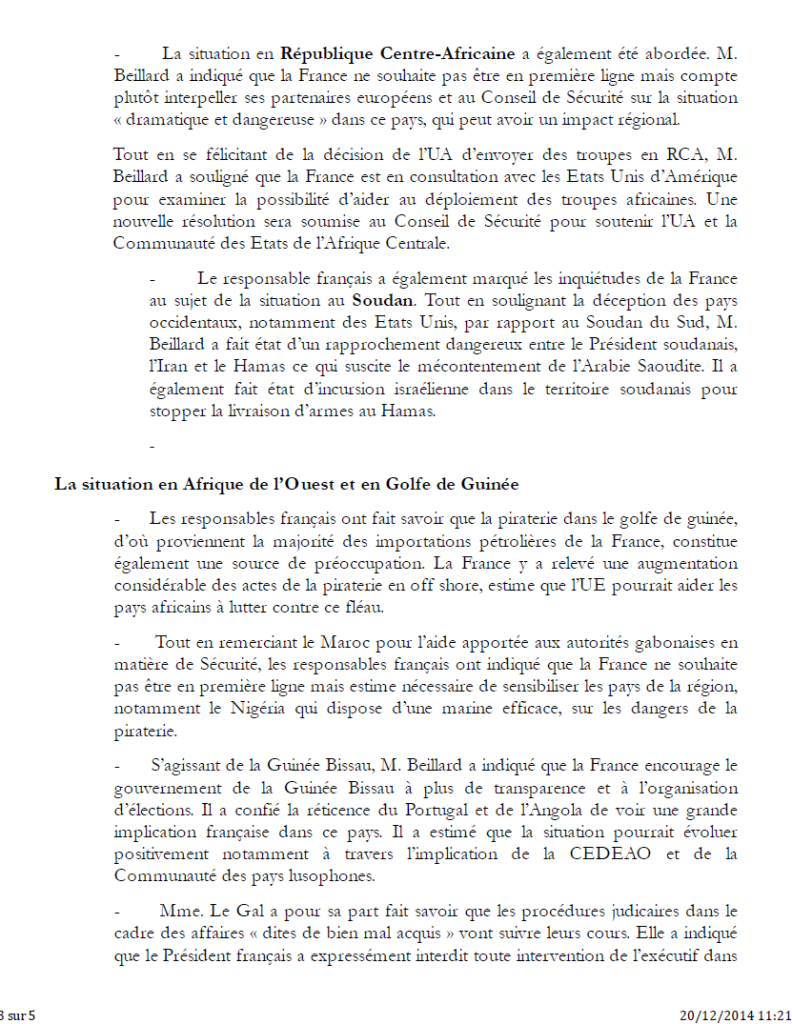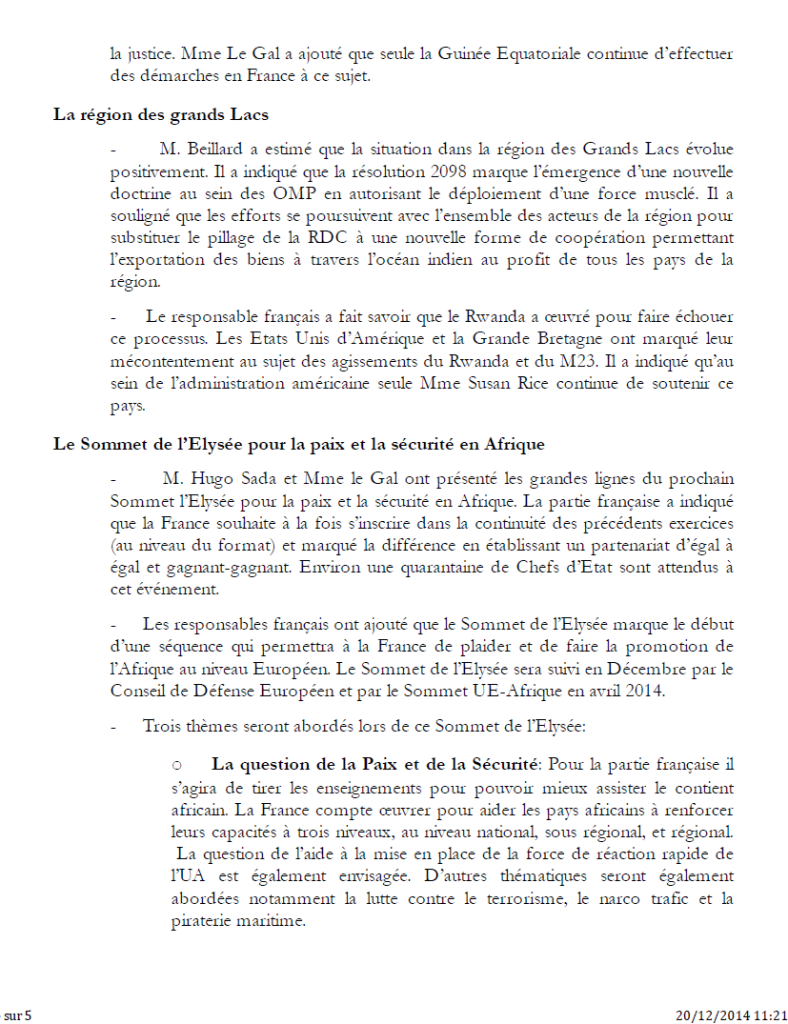Keywords: Morocco, France, Africa, Sahel, Algeria, South Africa, Western Sahara,
France is seeking to strengthen its partnership with Morocco, seeing it as a key player in Africa, particularly in the Sahel, while readjusting its strategies in the face of influence from Algeria and South Africa. To this end, Paris is providing unconditional support in the Western Sahara conflict.
———————————————–
From: Moha Tagma m.ouali.tagma@gmail.com
Date: 22/10/2013 12:46
Pour: bourita@maec.gov.ma
MOROCCO-FRANCE CONSULTATIONS ON AFRICA PARIS, SEPTEMBER 9, 2013
REPORT
During the meeting with the Ambassador of His Majesty the King to France and the Ambassador-Director of African Affairs, the French officials expressed their desire to « Africanize bilateral relations between Morocco and France. » Ms. Le Gal and Mr. Beillard expressed the wish to organize a visit to Rabat to continue political consultations with Morocco on African issues and also to prepare for the Elysée Summit. (Mr. Beillard expressed the wish to strengthen coordination at the level of New York, Paris, Rabat and Addis Ababa, specifying that instructions will be given to this effect to the French embassies in these capitals.) The following information emerged from these meetings:
The French side expressed its surprise and incomprehension at the position adopted by the Chairperson of the African Union Commission, Ms. Zuma, on the national question. French officials indicated that Ms. Zuma is very active on this issue and that her position does not reflect that of the majority of African states on the national question.
The national question within the African Union
Mr. Beillard indicated that he had noted « a certain annoyance » with the strong South African and Algerian presence within the AU. For the French official, the other major African countries, notably Nigeria and Ethiopia, intend to regain their rightful place and that this could constitute a positive element of positioning for Morocco. The next renewal of the post of African Union Commissioner for Peace and Security would probably not go to Algeria.
It should be noted that Ms. Le Gal indicated that the President of the French Republic plans to visit South Africa soon. The national issue, particularly the possibility of moderating stances against our country, could be discussed with the South African authorities.
The French authorities’ assessment of the role played by Morocco in the Sahel
French officials expressed their gratitude to Morocco for its support during Operation Serval in Mali. They expressed their conviction in Morocco’s historical, cultural, and strategic depth in the Sahel and Africa, and their condemnation of the maneuvers aimed at excluding our country from Sahelian issues.
The French side also expressed its concerns about the evolving situation in the region. The information available to it indicates a shift in the threat from southern Libya to Sudan and Niger.
In this regard, French officials expressed the need to find a cooperation framework that encompasses all the countries concerned, including Morocco and Algeria. They expressed interest in the possibility of expanding CENSAD to Algeria. The 5+5 framework extended to the Sahel countries could also be of interest, even if it is informal.
Mr. Beillard expressed his hope that Morocco would play a stabilizing role in the Sahel region on the religious level. He indicated that France has a particular interest in Morocco’s Sufi depth, which could constitute an essential counterweight to extremist Islamist movements in the region.
The situation in the Sahel and Central Africa
Regarding the situation in Mali, French officials expressed their satisfaction with the conduct of the presidential elections. Mr. Beillard stated that France will continue to remain vigilant on the Malian issue by maintaining a military presence (1,000 soldiers) and closely monitoring the issue of national reconciliation.
Mr. Beillard said the new Malian president maintains good relations with Algeria. He questioned the new Foreign Minister’s direction, emphasizing that France believes the Malian government will need to demonstrate balance.
While highlighting Algeria’s murky game in Mali and the Sahel (the Tuareg issue, its relations with Ansar Dine and with Captain Sanogo, who has since become a General), Mr. Beillard expressed his concern about the role that Algeria will play, particularly after the next presidential elections.
The situation in the Central African Republic was also discussed. Mr. Beillard indicated that France does not wish to be on the front line but rather intends to appeal to its European partners and to the Security Council about the « dramatic and dangerous » situation in this country, which could have a regional impact.
While welcoming the AU’s decision to send troops to the CAR, Mr. Beillard stressed that France is in consultation with the United States of America to examine the possibility of assisting in the deployment of African troops. A new resolution will be submitted to the Security Council to support the AU and the Community of Central African States.
The French official also expressed France’s concerns about the situation in Sudan. While highlighting the disappointment of Western countries, particularly the United States, regarding South Sudan, Mr. Beillard noted a dangerous rapprochement between the Sudanese President, Iran, and Hamas, which is causing discontent in Saudi Arabia. He also reported an Israeli incursion into Sudanese territory to halt arms deliveries to Hamas.
The situation in West Africa and the Gulf of Guinea
French officials have indicated that piracy in the Gulf of Guinea, where the majority of France’s oil imports originate, is also a source of concern. France has noted a significant increase in offshore piracy there and believes the EU could help African countries combat this scourge.
While thanking Morocco for its assistance to the Gabonese authorities in matters of security, French officials indicated that France does not wish to be on the front line but believes it is necessary to raise awareness among countries in the region, particularly Nigeria, which has an effective navy, about the dangers of piracy.
Regarding Guinea-Bissau, Mr. Beillard indicated that France is encouraging the government of Guinea-Bissau to be more transparent and to organize elections. He acknowledged the reluctance of Portugal and Angola to see significant French involvement in the country. He believed that the situation could evolve positively, particularly through the involvement of ECOWAS and the Community of Portuguese-Speaking Countries.
For her part, Ms. Le Gal announced that legal proceedings in the so-called « ill-gotten gains » cases will continue. She indicated that the French President has expressly prohibited any intervention by the executive branch in the justice system. Ms. Le Gal added that only Equatorial Guinea continues to take steps in France on this matter.
The Great Lakes region
Mr. Beillard considered that the situation in the Great Lakes region is evolving positively. He indicated that Resolution 2098 marks the emergence of a new doctrine within the peacekeeping operations by authorizing the deployment of a strong force. He emphasized that efforts are continuing with all actors in the region to replace the plundering of the DRC with a new form of cooperation allowing the export of goods across the Indian Ocean for the benefit of all countries in the region.
The French official stated that Rwanda had worked to derail this process. The United States and Great Britain had expressed their dissatisfaction with the actions of Rwanda and the M23. He indicated that within the American administration, only Susan Rice continued to support the country.
The Elysée Summit for Peace and Security in Africa
Mr. Hugo Sada and Ms. Le Gal presented the outlines of the upcoming Elysée Summit for Peace and Security in Africa. The French side indicated that France wishes to both continue the continuity of previous exercises (in terms of format) and make a difference by establishing a win-win partnership of equals. Around forty heads of state are expected to attend this event.
French officials added that the Élysée Summit marks the beginning of a sequence that will allow France to advocate and promote Africa at the European level. The Élysée Summit will be followed in December by the European Defense Council and by the EU-Africa Summit in April 2014.
Three themes will be addressed during this Elysée Summit:
The issue of Peace and Security: For the French side, the aim will be to draw lessons to better assist the African continent. France intends to work to help African countries strengthen their capacities at three levels: national, sub-regional, and regional. The issue of assistance in establishing the AU rapid reaction force is also being considered. Other themes will also be addressed, including the fight against terrorism, drug trafficking, and maritime piracy.
It is worth noting that the French side also announced France’s willingness to organize an EU-America-Africa Summit on drug trafficking in 2014. African countries’ support for this initiative could be sought at the Elysée Summit.
The question of development: French officials indicated that the meeting will examine ways to strengthen the partnership between France and Africa, and beyond that, between the EU and Africa, in a win-win manner. Several avenues of reflection are being explored, including human and intellectual exchanges, the establishment of financing instruments to promote growth, and the acceleration of growth through public-private partnerships.
The issue of climate change: French officials indicated that the Elysée Summit will be an ideal opportunity to pool efforts and harmonize positions in anticipation of the conclusion of a new international climate agreement at the COP21 Conference of States Parties in 2015 in Paris.
The French side, which would like to see strong participation from English- and Portuguese-speaking African countries, has indicated that countries suspended from the AU will not be invited to the summit. Egypt has not yet been invited to the summit, but this position could change depending on the political progress that country makes.
She stated that all delegations will be able to participate in the roundtable discussions, but that priority will be given to delegations represented at the head of state level. In this regard, Ms. Le Gal requested information on the roundtable at which Morocco would like to participate in order to include our country on the agenda.
DOCUMENT SOURCE :





#Africa #Morocco #France #WesternSahara


Be the first to comment on "Morocco Leaks: Paris-Rabat: Joint Offensive in Africa"